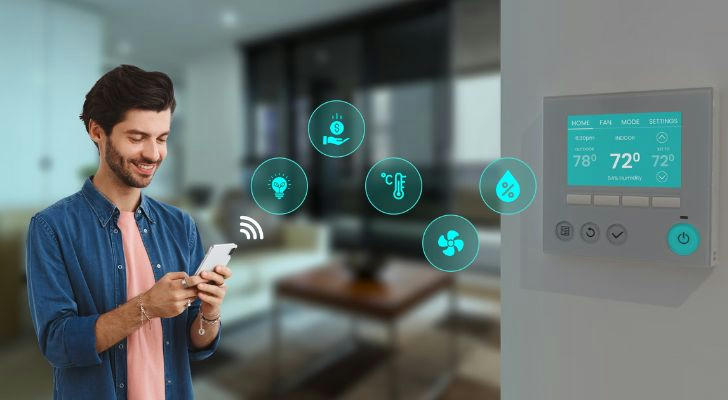The Future of HVAC: Smart Thermostats, Heat Pumps, and Artificial Intelligence
The HVAC (Heating, Ventilation, and Air Conditioning) industry is experiencing a powerful transformation driven by emerging technologies. With a global push for energy efficiency, sustainable design, and user-centric comfort, innovations like smart thermostats, heat pumps, and artificial intelligence are not just trends—they’re shaping the future of how we heat and cool our homes and workplaces.

Smart Thermostats: Intelligent Climate Control
Smart thermostats are no longer a luxury—they’ve become a standard feature in modern buildings. Products like Google Nest, Ecobee, and Honeywell Home offer users remote control, learning algorithms, and energy savings insights.
Key Features and Benefits:
- Learning Patterns: These devices analyze usage patterns and adjust temperature settings automatically for optimal comfort and efficiency.
- Remote Access: Control heating and cooling through smartphones or voice assistants, allowing energy management from anywhere.
- Energy Reports: Get detailed analytics on usage, helping reduce costs and carbon footprints.
According to the U.S. Department of Energy, households can save up to 10% annually on heating and cooling by using programmable or smart thermostats effectively. These devices are also a key component of smart home ecosystems, integrating with lighting, security, and occupancy sensors.
Heat Pumps: The Backbone of Energy-Efficient HVAC
Heat pumps are rapidly replacing traditional gas furnaces and air conditioning units in both residential and commercial settings. Instead of generating heat, they transfer heat, making them up to three times more efficient than conventional systems, as reported by the International Energy Agency (IEA).
Why Heat Pumps Are Leading the Shift:
- All-Season Use: They provide both heating and cooling using the same system.
- Lower Emissions: Ideal for homes transitioning away from fossil fuels.
- Incentives Available: Many governments offer rebates or tax credits for installing energy-efficient heat pumps.
In the U.S., the Inflation Reduction Act includes federal incentives of up to $8,000 for low- to middle-income households installing qualified heat pump systems. As heat pump technology improves, even colder climates are benefiting from variable-speed and cold-climate models.
Artificial Intelligence: The Brain Behind HVAC Systems
AI is quietly revolutionizing HVAC systems behind the scenes. From predictive maintenance to real-time energy optimization, AI-driven software is helping technicians and homeowners make smarter decisions.
Applications of AI in HVAC:
- Predictive Maintenance: Sensors detect anomalies in system behavior before failure occurs, reducing downtime and repair costs.
- Dynamic Energy Management: AI adjusts HVAC operations based on weather forecasts, occupancy, and usage history.
- Autonomous Control: Learning systems make micro-adjustments in real-time for maximum efficiency.
Companies like Johnson Controls and Siemens have already deployed AI-enhanced HVAC platforms in commercial buildings, reporting up to 30% energy savings and better occupant comfort. For homeowners, AI-driven HVAC apps are being integrated into building management systems and smart home hubs.
Integration and Interoperability: Creating Smart Ecosystems
The real power of HVAC innovation lies in system integration. Smart thermostats, AI tools, and heat pumps work best when connected through a centralized platform. This allows homeowners and facility managers to control everything from one dashboard.
Benefits of Integration:
- Unified Monitoring: Track performance across systems and get real-time alerts.
- Energy Benchmarking: Compare usage across time, zones, or similar buildings.
- Customized Comfort Zones: Personalize heating/cooling schedules per room or individual.
As building codes evolve and the push for decarbonization increases, these integrated systems are no longer optional—they’re becoming essential for compliance and cost-effectiveness.

The Global Outlook: Innovation Meets Regulation
The future of HVAC is being shaped not only by consumer demand but also by policy. The European Union’s Green Deal, California’s Title 24 standards, and Canada’s Net-Zero Building mandates are all pushing for rapid adoption of smarter, cleaner HVAC systems.
Future Trends to Watch:
- Geothermal Heat Pumps: Using underground energy for stable efficiency year-round.
- Carbon-Free Homes: All-electric HVAC systems powered by renewables.
- AI Technicians: AI-assisted diagnostic tools becoming part of standard toolkits.
Market research from Allied Market Research projects the global HVAC market to reach $367 billion by 2032, with smart systems and eco-friendly solutions leading growth.
Final Thoughts
As smart thermostats become more intuitive, heat pumps become more efficient, and AI continues to enhance system intelligence, HVAC is moving toward a greener, smarter, and more automated future. Whether you're a homeowner, builder, or technician, staying informed and embracing these technologies can lead to lower costs, better comfort, and a more sustainable world.
Now is the time to upgrade, upskill, or innovate—because the future of HVAC isn’t coming. It’s already here.
